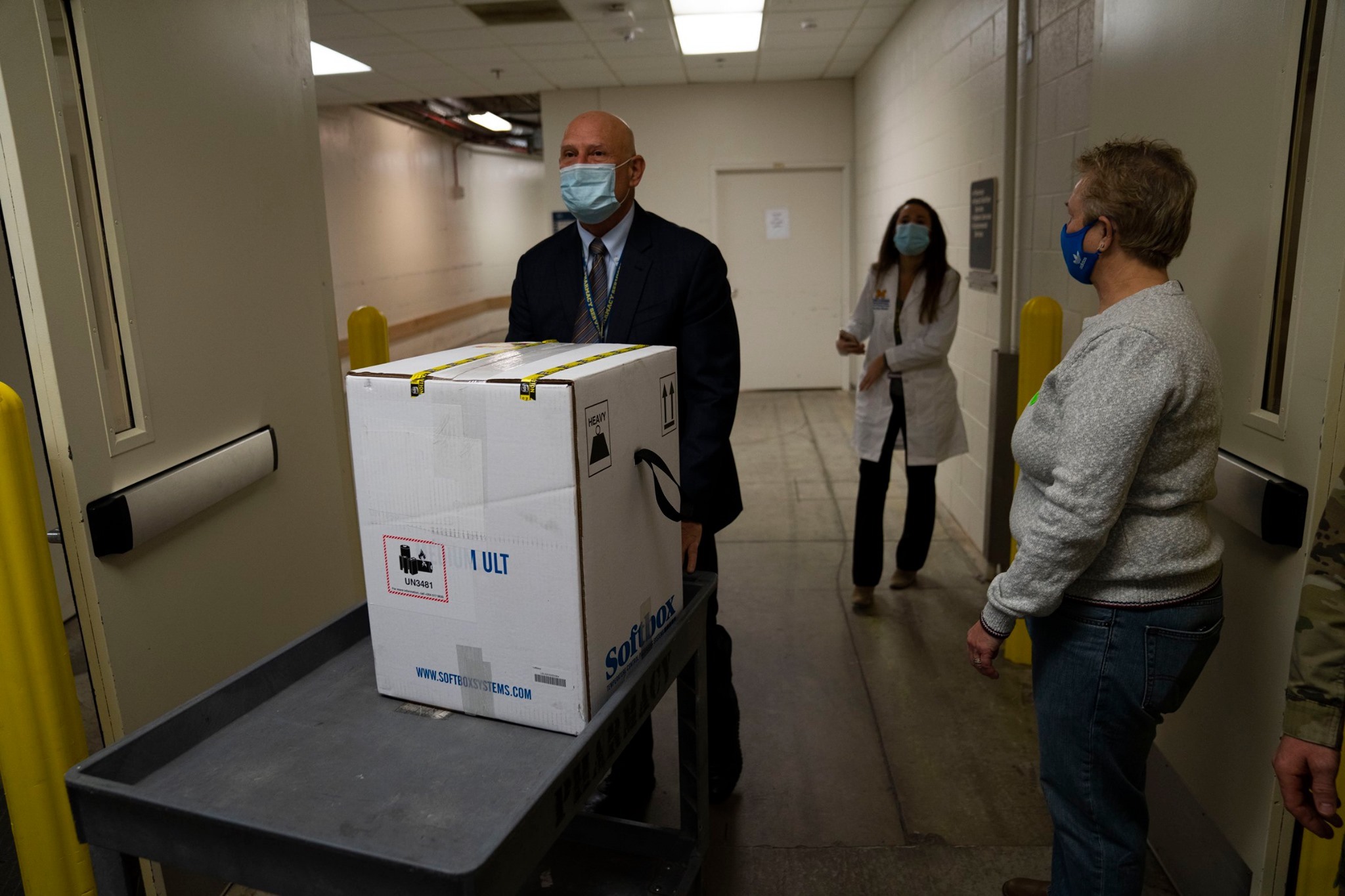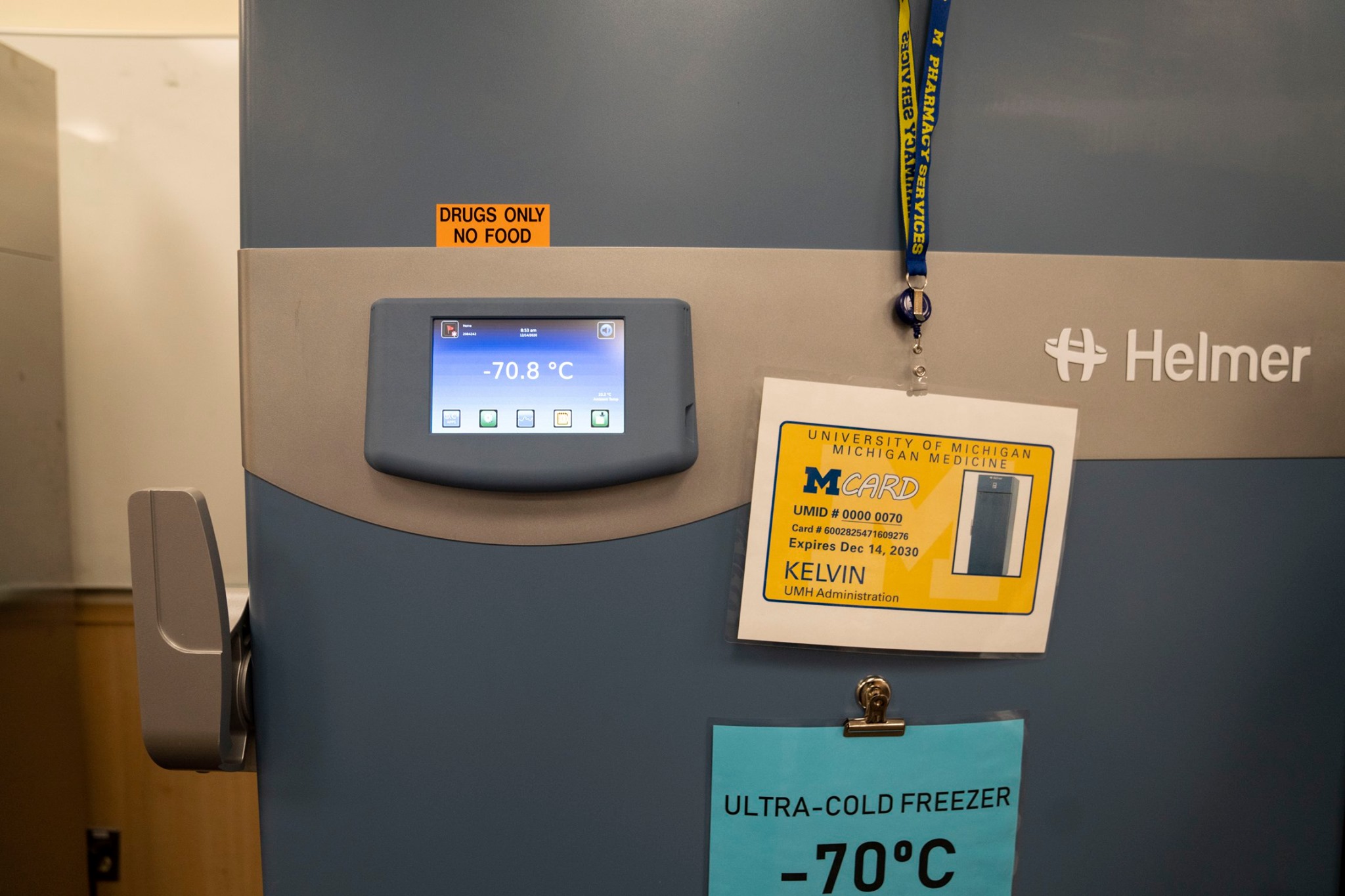
Associate Dean Stan Kent Plays Central Role in Michigan COVID Vaccine Rollout
January 27, 2021
After many grueling months of the COVID-19 pandemic, hope arrived at Michigan Medicine via UPS. Last month, Stan Kent, RPh, MS, FASHP, Chief Pharmacy Officer at Michigan Medicine and Associate Dean for Clinical Affairs at the University of Michigan College of Pharmacy, wheeled the first shipment of Pfizer’s COVID-19 vaccine into the hospital’s pharmacy.
Dean Kent and his team prepared for this day for months. “We ordered an ultra-cold freezer, nicknamed Kelvin, when we learn the Pfizer vaccine required minus 70 degree storage,” recalls Dean Kent. “We created procedures for inventory oversight, clinic ordering, transportation, temperature documentation, and expanded our staff to handle the new workload. We also conducted a security assessment of our storage space, ultimately adding cameras and card-restricted access.”
Chief pharmacy officers play a key role in the health system infrastructure, planning, organizing, and directing pharmacy operations, while contributing to lowering drug costs, positively impacting patient care, reducing readmissions, and creating patient care efficiencies.
“About 60-70% of my time is now spent on COVID related work, mostly assuring appropriate ordering, receipt, storage, security and distribution of the vaccine,” explains Dean Kent.
“As challenging as this endeavor is, all of the aspects of vaccine distribution and administration fall into both community and hospital pharmacists’ skill sets and expertise,” adds Dean Kent. “The big difference with COVID is that the volume is much greater.”
As the COVID-19 vaccines begin to arrive at more communities across the country, Dean Kent shares a few recommendations for pharmacists, who are playing a critical role in vaccine administration across the country: “carefully read the CDC’s guidelines on storage and handling, and particularly critical, closely monitor and document temperatures while transporting to immunization sites.”
The University has started the massive effort to vaccinate all U-M and Michigan Medicine faculty, staff, students, and patients. Right now, vaccine supplies are limited. Dean Kent and collaborators on the COVID-19 Vaccine & Therapeutics Taskforce, a multidisciplinary team of experts, have developed a prioritization for distribution based on guidelines from the Centers for Disease Control and Prevention’s Advisory Council on Immunization Practices, and the Michigan Department of Health and Human Services (MDHHS).
To facilitate the prioritization and update the community on the status of the vaccination effort, U-M has launched Blue Queue.
Hopes are high that the vaccine will turn the tide of the pandemic, but supplies remain limited and roll out efforts are hitting roadblocks. “MDHHS determines our weekly allocation of vaccine,” says Dean Kent. “We know more vaccine will be available soon and it’s just a matter of when people will get it – not if they will get it.”
As vaccination production continues to ramp up and we move into later phases of the roll out, Dean Kent has a few words of advice for pharmacists and patients.
“A few things that are different, thus far these vaccines require 2 doses that must be of the same brand at specific intervals (21 or 28 days),” says Dean Kent. “Also of note, once removed from the freezer, there are specific timeframes in which they must be administered due to stability limits. Lastly, the dose for the Pfizer vaccine is 0.3 ml which is different from other vaccines.”
“To patients, the vaccine is safe and effective and you should get it. Dr. M. Roy Wilson put it well in his recent editorial in the Detroit Free Press. There is a lot of fear, misinformation, and distrust of the vaccine; however, it is our best hope to end the pandemic.”
About Stan Kent
Stan Kent is the program director for the Health System Pharmacy Administration and Leadership residency at Michigan Medicine. He received his BS in Pharmacy from the State University of New York at Buffalo and an MS in Hospital Pharmacy from the University of Wisconsin. He completed a 2-year residency in hospital pharmacy administration at the University of Wisconsin Hospital. Mr. Kent has worked as a clinical pharmacist, clinical manager, assistant director, director, and assistant vice president in academic and teaching hospitals. While not combating a global pandemic, he delights in time spent with his family, travel, golf, and skiing.
Latest News
Dr. Mustapha Beleh wins 2025 Teaching Excellence Award
April 22, 2025
Dr. Beleh is a two-time winner of this award, previously receiving the recognition in 2019.
Professor Amanda Garner Named Charles Walgreen, Jr. Professor
March 28, 2025
Author: Markie Heideman, Content Marketing Manager Media Contact: Lindsay Groth, Director of Marketing and Communications, [email protected] Amanda Garner, PhD, has been named Charles Walgreen, Jr. Professor of Medicinal Chemistry, as approved by the Regents of the University of Michigan. Both The Charles Walgreen, Jr. Professorship created in December 2024 and the already-established Charles R. Walgreen, […]
Professor Shiyanbola Elected to Behavioral Medicine Fellowship
March 27, 2025
This SBM fellowship is not only a recognition of Dr. Shiyanbola’s hard work but an opportunity to mentor early-career investigators.
